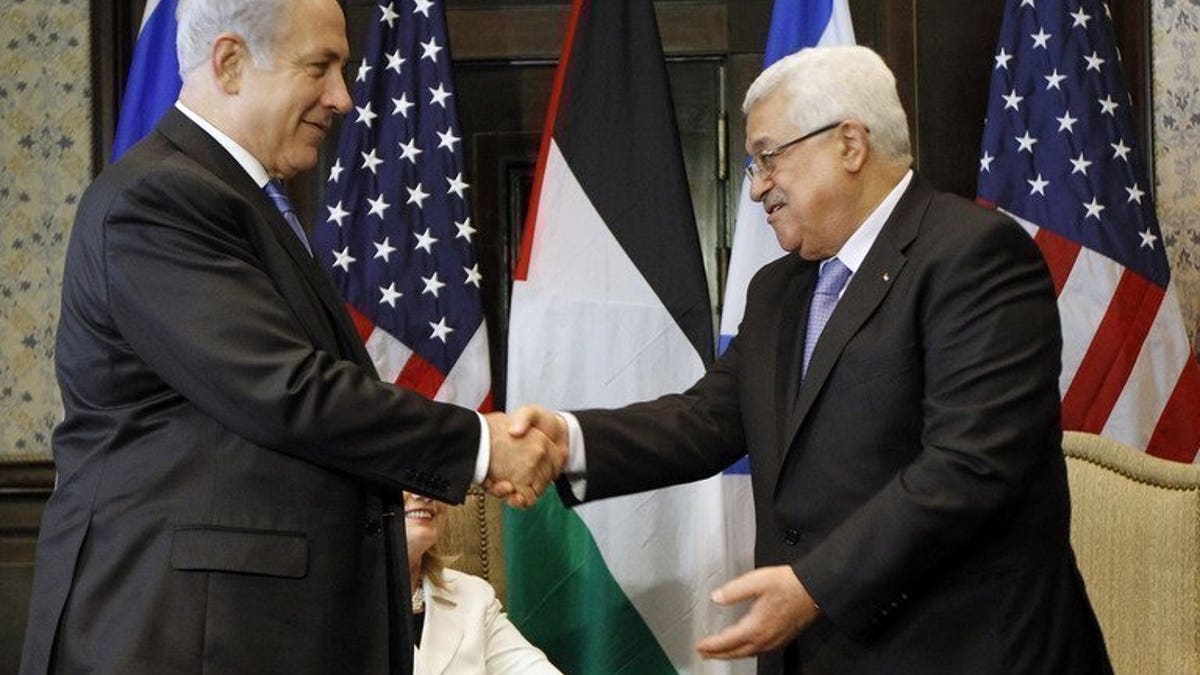
Israeli Prime Minister Benjamin Netanyahu (left) shakes hands with Palestinian president Mahmud Abbas during talks in Sharm El-Sheikh, on September 14, 2010. Middle East peace talks, which resumed in Washington after a three-year break are doomed to fail, Palestinian analysts said after negotiators set a nine-month target for an agreement. (AFP/File)
JERUSALEM (AFP) – Middle East peace talks, which resumed in Washington after a three-year break are doomed to fail, Palestinian analysts said on Wednesday, after negotiators set a nine-month target for an agreement.
Despite Israel announcing the release of 104 prisoners as a confidence-building measure, analysts said that ordinary Palestinians would take little interest in the talks, which they would regard as a sop to Washington.
"The talks are doomed to failure. There's no chance for success," Palestinian political analyst Abdel Majid Sweilam told AFP.
"These talks are to make the United States happy, because the US still sees the Palestinian issue as a key to solving the problems in the Middle East," he said.
"The US knows its strategy in the region has failed with the recent changes (in Arab countries) and it wants to force the Israelis and Palestinians to the table, not because talks will succeed but because it needs them to happen," he said.
Israel's release of 104 inmates imprisoned before the 1993 Oslo accords, agreed by the government on Sunday, would fail to appease the Palestinian public or convince them talks are serious this time, Sweilam said.
"The Palestinian public is not convinced by a return to talks the basis of which is unclear. They won't be appeased by a release of prisoners -- no matter how sensitive that issue is -- for half-hearted commitments to talks."
Fellow Palestinian analyst Hani Habib agreed.
"The Palestinian street isn't interested in, and doesn't think it's affected by, what happens in the peace process," he said.
"The average Palestinian citizen has grown accustomed to years of there being no talks, and is more interested in their own wellbeing. The only elements of Palestinian society interested in the big (peace) issues are the politicians and the media.
"Releasing the prisoners was, in the eyes of the public, something that should have happened after the Oslo accords anyway, so it shouldn't be seen as a special favour for a return to talks," Habib said.
Political analyst Samir Awad too said the prisoner release would be taken for granted by Palestinians.
"The freeing of prisoners is a goodwill gesture by an Israel under pressure from the United States. But it's not enough, and doesn't mean negotiations will succeed," Awad said.
"The prisoners should have been released after Oslo. Their release won't be enough for the Palestinian people, even though the day it happens will be a big occasion.
"The Palestinian people don't feel they're part of the peace process. The decision to return to talks was communicated by the media first, not by Palestinian officials," Awad added.
Sweilam said there was not enough at stake politically to push Palestinian president Mahmud Abbas to make progress in the talks.
"Abbas's popularity is in no way linked to the return to talks, and he won't lose the people's confidence because of entering (failed) negotiations."
Sweilam said that Abbas's main goal would be to ensure Israel took the blame for the failure of the talks and he said that should be achievable given the fierce opposition to any deal from within Israel's right-leaning governing coalition.
"Israel isn't ready. The government itself is split over the issue" with some openly opposing the creation of a Palestinian state, he said.
And the analysts said the issue of Jewish settlements in the occupied West Bank, which triggered the breakdown of the last round of talks in September 2010, would prove even more of a sticking point this time with hardline pro-settler ministers inside the Israeli government.
"Israel can't stand up to the extremist settler lobby. How could it evict half a million Jewish settlers? It's doomed to failure.
"But it's important for Israel to reach the stage where it faces off with the settlers. At that point, the failure of the talks will be its responsibility," Awad said.








































